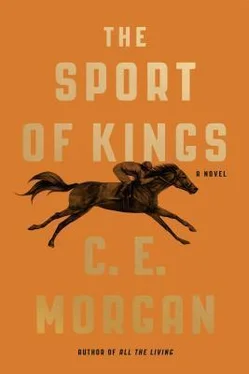Which was why she hated this particular week of … involvement. There was the picking of the apples, which was hard physical work. Then there was the peeling and the piecrust making, the sorting, then the mashing in an enormous old sugar kettle that — she’d bet fifty dollars if anyone actually cared — probably dated from slavery days. Then the boiling of lids and jars, the canning, the sealing, then sauce making, cider making, which meant the addition of crab apples, which she was allergic to, so her eyes swelled up just from looking at them, and everyone said, “Oh, Maryleen, dear, have you been crying?” to which she yearned to reply, “Oh, Massah, yes, I’s just cryin’ thinkin’ ’bout where I’m a go affa Emancipation — oh!” But tongues were for biting. You just did what you had to do to get them out of your hair, which was help them, which was what she was doing today. They had spent the morning hours up and down like spiders on the ladders plucking Foxwhelp from the branches, so she would be able to start the cider in the morning. She had already gotten Filip to drive her to the A&P to purchase the sugar and nutmeg she’d ordered for the cider, and now they were trundling baskets from the orchard to the kitchen, and she was sweating so much that she couldn’t stand the smell of herself. The day was unseasonably hot for November, a put-chipped-ice-in-your-tub-water kind of hot. And she was already irritated enough with the woman helping and Filip and the boy underfoot. If she’d had eight arms, she would have done the whole thing herself and let that be the end of it. But here she was with the white boy tagging after her — well, he wasn’t a boy anymore, he was a teenager and not that far behind her in age, maybe five or six years. He was less talkative than he had been even just recently, but he still had plenty of irritating things to say, going on and on about the head of a horse, and wasn’t it like the Sistine Chapel, just a marvel of architecture, and he was explaining in detail what the Chapel was (as if she didn’t know!), and she was being very careful not to roll her eyes unless her back was to the boy — teenager. And there was his mother, picking apples in heels. Low heels, but heels. When Jesus comes back, everyone will be changed, that’s what her father always said. He could not get his ass back here soon enough.
Somehow, during the heat and bustle of the day, she managed to shake them all. She’d gone round front to sit with a glass of tea and then, upon returning to the orchard, there’d been no one there at all, just empty ladders by the trees, staircases that went nowhere. She stood in the pleasing stillness for a moment, holding her empty glass, absorbing what was undeniably the amber beauty of the autumn day, and then, fatigued and finally easy because she was alone, she padded into the kitchen feeling almost pacified. There, dozens of apple baskets stunned the eye with their heaped red, and she heard herself sigh. Except she hadn’t sighed. There was a snuffling sound. She thought the boy was crying in the pantry, because he liked to hide there when he was upset, and she was always the one to find him, because she was always the one in the kitchen, though of course she never comforted him, just took him firmly by the elbow and delivered him to his empty-headed mother. Maryleen took a single step toward the pantry, which led off from the kitchen by the stove, and she knew, suddenly, exactly what she would find, because she sensed things, because her mind had been prepared by many novels that taught her everything she needed to know about the human sex impulse (a thing she wouldn’t learn from life, because she found men repugnant), and then there they were, Filip and the lady of the house, clutching at each other, the woman making hideous throat sounds against his mouth, probably because she was deaf — God, please don’t let that be a normal kissing sound — and with the negative of their black and white scorching her eyes, she fled from the kitchen on the balls of her feet, her white tennis shoes making nary a squeak, her hand smacked over her mouth. She fled around the side of the house, a bright red blooming through the smooth darkness of her cheeks, and, absurdly, in a panic, she crawled between a juniper bush and the side of the old house and sank down on her haunches there, hidden from sight. She breathed raggedly into her palm, leaning back against the bare bricks, her eyes wide. There she remained until her breathing returned to almost normal, though now her fury was risen like a fire that rages once the winds calm. When her legs had all but fallen asleep, she heard the boy walk by talking to himself, and then she could no longer stand the tingling in her legs; she crept out from the bushes, feeling absurd and looking around. There was no one to be seen. She coughed loudly as if in a fit, walking around to the kitchen door. She swooped up an empty apple basket in her hands and said “Lord!” loudly, for no discernible reason. Then she went on into the kitchen, allowing the door to clatter terribly behind her. No one was there. With nothing less than absolute fear, she walked into the pantry, but it was empty too, and she sagged against the wooden shelving closest to her, then reached out and touched the wavy glass of a bell jar, angrily mouthing her thoughts. She didn’t know how long she stood there before she heard the sounds of his feet, and she knew they were his because she’d memorized the family’s footfalls, the better to avoid them. She flung herself into the doorway of the pantry, her hands clutching the doorjamb on both sides. Her eyes were wide, sloe-deep with fury. Filip started when he saw her, when he saw her face.
“Get in here!” she said, her voice brooking no alternative.
Whether he was startled by her tone, or by the strange fact of youth wrangling age without reserve, he simply did as he was told and stood before her there in the pantry, looking down curiously with that diffident blankness she knew he’d earned by right of his skin, but which she had no sympathy for. Not today.
She raised a straight, slender finger right up to his face. “You idiot!” she hissed.
There was no change in his face, except his eyes narrowed almost imperceptibly, then he made a move to go, so she reached out and grasped up his shirtfront in her fist to pull him back around. Her grip was so hard it threatened the hold of the seams.
“Are you crazy?” she whispered, but to her own ears it sounded like hollering. “You know where you’re going to end up? Nigger, they’re going to hang you from a tree!”
He refused to answer, refused by turning again to leave, but Maryleen reached up with her free hand, and with a feeling of something near glee, which she would allow herself to acknowledge only later, she slapped him hard across the face.
He just stared at her in wordless shock while she said, “Have you lost your damn mind? Stop this madness! Don’t touch her again!”
And then, like an actor showing up late for his cue, the boy was in the kitchen, just standing there slack-armed between the butcher block and the sink, looking up into their faces with his mouth slightly ajar. Maryleen let loose Filip’s shirt, and the man was gone in an instant, shouldering past the boy, who stepped aside to let him go, all the while continuing to look up into Maryleen’s flushed face. He said, “I just wondered where everyone went.”
“We’ve been right here,” she said smartly, moving past him into the kitchen, so that she could reorder her expression without his eyes on her. “Right here the whole time.”
The boy turned slowly on his heels to watch her, but he didn’t follow. His face was soft, just the faint beginnings of an unreadable expression perched there.
“Where’s Mother?” he said slowly.
Читать дальше
Конец ознакомительного отрывка
Купить книгу












